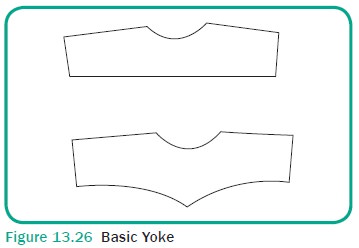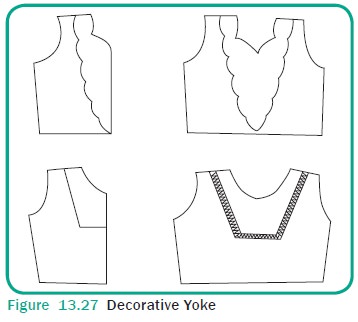Introduction, Types, Summary | Sewing Garment - Yokes | 11th Textiles and Dress Designing : Chapter 13 : Sewing Garment Details
Chapter: 11th Textiles and Dress Designing : Chapter 13 : Sewing Garment Details
Yokes
YOKES
Introduction
Yoke is one segment of the garment that can be
constructed on the garment. It can be seen in the garment of children, men and
women. It is introduced in a garment based on the need and to hold the
gath-ers. For decorative purpose, it is sewn at shoulder, upper and lower part
of the hip. Yokes can be constructed with different structures, variations like
‘V’ shape, oval shape or with different colour according to the taste and need
of person.
Types of Yokes
Yokes are classified based upon the pat-tern made
and decorations as plain or basic yoke and decorative yoke.
Plain / Basic Yoke
Plain or basic yoke has got simple struc-ture. It
can be placed on front and back part of men’s shirt. According to the shape of
garment, use of garment, age of per-son, yokes are suitably cut and joined.
This yoke is a part of the garment which is cut and joined with a piping or
seam. Example : Bodice block of a
body front cut half way through to
add with gathers to the rest of the garment.
For drafting yokes take a bodice pattern and mark
from the shoulder to the center of the front bodice. This tech-nique can be
used to construct ‘V’ shaped and circular shaped yoke. To construct a straight
yoke, marking should be made according to the length of yoke from arm scye to
center front,(Figure 13.26).

Decorative Yoke
Contrast colour materials can be used for making
yoke. Use of various tucks, pleats and frills add interest to the garment.
According to the wish of wearer, piping or frills can be stitched at the edges
of the yoke.
Yoke can be joined using plain fabric or by
adding one or more layers for stiffness. For skirts, yoke is cut to the shape
of the waist line. Then the skirt part is gathered and attached to the yoke.
The bottom of the yoke should match to the size of the gathering in the skirt.
To construct yokes with curved edges on panel
skirt, lapped seam can be used. These kinds of yoke can be used on the bodice
part of kid’s front, upper part of night dresses and on the waist bands of
skirts. Yokes of desired shape can be cut and stitched and decorations using
embroideries can be added to the gar-ment. (Figure 13.27).

Summary
Yokes are shaped pieces of fabrics used as a part
of a garment. Shapes add decoration to garments. It can be used to create
fullness or be a part of the garment from where fullness can be provided. Yokes
can create interest and variation in garments. Yokes are often seen on men’s
shirts. They can be used in women’s tops, skirts and baby frocks also.
POINTS TO REMEMBER
·
Yokes are separate part of a garment.
·
Variations in garments can be created using
yokes.
·
Proper placement of yoke is very important.
·
Yokes are of two types, namely yokes without
fullness (basic yoke) and yokes with fullness. (decorative yoke)
· Yokes can be introduce in a garment to release fullness and for ease of movement.
ACTIVITIES FOR THE TEACHER
·
Draw or collect yoke variations and display in
the class notice board to create interest in dress designing.
ACTIVITIES FOR STUDENTS
·
Prepare a paper pattern for a yoke without
fullness (basic yoke) and with fullness (decorative yoke) using a basic bodice
front pattern.
Related Topics